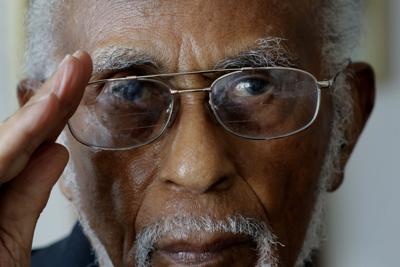For more than two centuries, Black soldiers have fought and died in battle to preserve the freedoms treasured by so many in the United States — even when, by the mere color of their skin, they were denied those freedoms themselves.
A legislative proposal to build a new monument in Louisiana honoring the often overlooked contributions of those Black service members passed its first hurdle in a Senate committee on Wednesday.
The structure would be built with private funds on the grounds surrounding the Old Arsenal Museum, known as the Louisiana Veterans Memorial Park, and join other monuments honoring Gold Star Families and National Guardsmen.
"By erecting a monument specifically to honor African American veterans in Louisiana, the state will be memorializing and celebrating a group of veterans who far too often face discrimination and persecution when they return home from serving their nation," said Sen. Gerald Boudreaux, a Lafayette Democrat sponsoring the measure.
Though Black soldiers have fought in battles as far back as the Revolutionary War, they first garnered widespread recognition for their bravery and sacrifices after the Civil War Siege of Port Hudson, just miles north of Baton Rouge, said Aaron Sheehan-Dean, a history professor at LSU.
Among the Union troops that battled to take control of the Mississippi River from Confederate forces were more than a thousand Black soldiers, former slaves and free men. The signing of the Emancipation Proclamation in 1863 cleared the way for their enlistment and Port Hudson represented one of the first public tests for how these men would perform in battle.
"They succeeded brilliantly, albeit at a high cost," Sheehan-Dean said.
The Union forces failed to break the Confederate line, but in defeat, the soldiers exhibited exceptional heroism and grit. Amid the battle, a captain observed one Black soldier limping away from the hospital and toward the front. When he asked the soldier where he was going, the fellow replied that though he had been badly shot in the leg, he had more to give.
Within the regiment of Black soldiers who fought for the Union in Louisiana was a formerly enslaved man named Gordon — whose brutal scars from his time on a St. Landry Parish plantation were immortalized in series of widely circulated photographs that laid bare the horrors of slavery.
"There is no question that Black soldiers enabled the Union to preserve itself," Sheehan-Dean said.
In later wars, Black soldiers often returned home from serving abroad to second-class status — or worse. In 1946, Sgt. Isaac Woodward, a decorated WWII soldier, was beaten and permanently blinded by police officers in South Carolina after challenging a bus driver who called him "boy." He had just returned from three years of military service in the Pacific and was still wearing his uniform.
Johnnie Jones, Sr., who joined the military in 1943 out of Southern University, was a warrant officer in a unit responsible for unloading equipment and supplies onto Normandy. He remembered coming back to the U.S. after the war's end and having to move to the back of a bus as it crossed the Mason-Dixon line separating North from South.
"I couldn't sit with the soldiers I had been on the battlefield with. I had to go to the back of the bus," Jones, who went on to become a lawyer and civil rights activist in Baton Rouge, told the Associated Press. "Those are the things that come back and haunt you."
The proposal to build a monument for Black soldiers was received skeptically by Sen. Gregory Tarver, a Black Democrat from Shreveport who served in the Vietnam War, during the hearing at the Senate and Governmental Affairs Committee.
"Since all of us are supposed to be American, do you think there should be just one monument?" Tarver said. "The biggest problem we have in this country is we keep dividing everything."
"I agree with you, we need to be one America," Boudreaux responded. "But you can't do that until you make up for past shortcomings ... I look at it as an opportunity for us to recognize African Americans who, just like you, made the ultimate sacrifice and have never been recognized."

